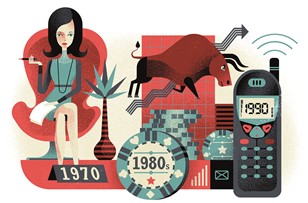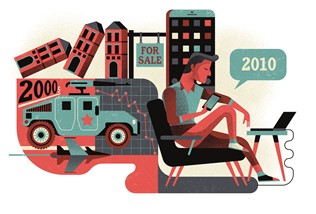THE FIRST HALF-CENTURY
By | Fall 2017
FIFTY YEARS AGO, THE NOTRE DAME MBA WELCOMED ITS FIRST CLASS. HERE’S A LOOK BACK FROM AN ALUM IN EACH OF THE FIVE DECADES.
The wall between the real world and the Notre Dame MBA is purposely tissue-thin and porous — a program that simultaneously is shaped by and seeks to shape the challenges of its time. And now, at its 50-year mark, what a legion of change it has seen.
The decade of its launch is sometimes called “the decade that changed the nation” because it was marked by complex political, social and scientific change that meant upheavals on the largest scale to everyday life. Civil rights marches. A murdered president. I Have A Dream. Violence and unrest in the streets. Vietnam. The Beatles. Woodstock. One small step for man...
The business world was not immune, and neither was the world of higher education.
As the U.S. emerged from World War II with the only intact economy, its economy burgeoned at a rapid rate, and so did the demand for a new class of professionals well-educated in the ways of business — specifically in management, according to O’Hara’s Heirs: Business Education at Notre Dame, by Kerry Temple. In 1908, Harvard was the first to offer an MBA program, and other schools began to follow. By the 1960s, more than 7,000 MBA degrees were awarded nationally, an increase of 85 percent over the previous decade.
At Notre Dame, leadership realized it was time for the College of Business Administration to launch its own MBA program. Dean Thomas Murphy and his assistant John Malone envisioned a graduate business program that was rigorous and challenging, and in keeping with the Notre Dame mission, brought to bear the higher ideals of Catholic thought.
In the fall of 1967, 43 graduate students — all men — took seats in a tiered classroom in Hurley Hall, the original home of the business school. Twenty-two were “kids” fresh from their undergraduate programs. Some already had a taste of working life as accountants or managers. Others aspired to positions in marketing, consulting, or banking. More than a few were married and starting young families. Several were military veterans. One was a priest.
Just as their paths to the Notre Dame MBA program were varied, so too, would be their journeys and those of the graduates to follow.
1960s

Joe Cavato (’69), a member of the first graduating class, remembers being asked, early on that first semester, to write about where he expected to be in five years.
His memory of his answer is just as vivid. In five years, he would be a partner in a Big Eight accounting firm.
Perhaps he would have followed through on that goal — if it had been five years earlier, or even five years later. But no matter how immersed he was with his studies, Cavato couldn’t tune out what was going on in the country.
“Newark, Detroit, civil unrest all over the country,” he says, referring to the race riots during that angry summer of 1967. And at the same time, college campuses were heating up over the Vietnam War. “Bobby Kennedy came to campus in his campaign for president,” he adds.
That took place early in the day on April 4, 1968. By that evening, Martin Luther King Jr. had been shot on the balcony of a motel in Memphis. Two months later, Kennedy would be assassinated, too. “Long story short,” says Cavato, “it began to occur to me that business and accounting might not be the most important and interesting thing I could devote my life’s work to. So I changed direction.”
Cavato didn’t stray far, as it turned out. His understanding of finance as well the leadership skills he had developed were scarce commodities in the public sector at that time. MBA in hand, Cavato took a position in community development and low-income housing in St. Louis County, Missouri. That was the beginning of a satisfying career in which Cavato moved from fiscal leadership in the public sector to municipal finance in the investment banking industry and over to policy development and public planning in local government.
Today, he continues to play an active role as a real estate development and finance consultant. His MBA degree has never let him down. “Through providence and good luck,” he says, “I was always able to transfer my training to fit the job.”
Looking back, Cavato considers his time in the program to be a singular experience. “We and Dean Malone and the rest of the administration were inventing the Notre Dame MBA from whole cloth. It was truly a unique experience for us and the program, which has grown to such prominence and success.”
1970s

By the time Betty Gallagher (’74) enrolled in the Notre Dame MBA program, there were four women total in the entering class. The Vietnam War was winding down and the women’s liberation movement had emerged to bring about a new sensibility about women’s rights.
Gallagher entered the program fresh from earning her undergraduate degree from the University of Dayton, which was the common route in the early days of MBA programs. Dayton, like Notre Dame, had a lopsided ratio of male to female students, so Gallagher had already developed a certain confidence in holding her own in a male-dominated classroom. She decided on a business career after cycling through majors in liberal arts, education and business education before realizing that business was the best fit.
This was a time when women were entering the workforce in positions traditionally held by men in much greater numbers. By 1972, the percentage of women in professional jobs was about 44 percent, according to labor figures.
By the time she graduated, the economy was strong and Gallagher had a job lined up, as did most of her classmates. Living and working in the Chicago area until she retired in 2014, she calls her long professional life a “Monopoly” career: She worked in management for a large industrial company, a railroad, and a major utility where her roles included market research, service design and regulatory affairs. At both the Burlington Northern Santa Fe Railway and Commonwealth Edison, she was deeply involved in industry deregulation.
“At the time, having an MBA was the way to go,” she recalls. “It opened a lot of doors. It was a marker that you were serious. In a couple of cases, I had people say they wouldn’t have even interviewed me if I hadn’t had an MBA from a known school.”
1980s
It was the great Bull Market of the 1980s when Perry Dellelce (’87) prepared for his profession — which was perfect for the young Canadian who had been fascinated with the stock market since he was a kid. He planned to become a corporate securities lawyer. But first he came south to Notre Dame to study in the MBA program.
“It was the junk bond era — Drexel Burnham and Michael Milken,” said Dellelce, who also is a member of Mendoza’s Business Advisory Council. “And it was the time of many mid-cap and small-cap companies getting financing and being able to do takeover bids and transactions they would never have been able to do otherwise. So it was very much a glorified time on Bay Street (Toronto’s equivalent of Wall Street). Leveraged takeovers started then, as well. As a student, watching it all was kind of cool.”
Dellelce went on to the University of Ottawa law school after receiving his MBA. In 1993, he co-founded the corporate finance and transactional law firm, Wildeboer Dellelce. He’s recognized as a leading Canadian practitioner in technology transactions and global mining, and was chosen as Canadian counsel recently in the largest restructuring of U.S. Steel Canada. Dellelce is active in local and regional community efforts, and serves as a member of the Canadian Olympic Committee. He just was tapped to chair the Canadian Olympic Foundation board of directors.
“I had a classmate once who said we’re getting an MBA when it’s a penny stock, and it’s going to grow to a blue-chip stock. And I think that’s turned out to be true,” Dellelce reflects. “Thirty years ago, the business school was just starting its Executive MBA program. We didn’t have all the Wall Street firms there recruiting like we do now. The requirements didn’t demand work experience, whereas now work experience is almost mandatory. Now the MBA is a big part of the business school, whereas then it was more like an adjunct.”
1990s
Back when senior vice president Christina Glorioso (’99, ’95) was wrapping up her MBA, people had cell phones. Smart phones, on the other hand, were just a gleam in Steve Jobs’ eye. And the most pressing technological issue of the day was Y2K.
Following graduation, Glorioso went to work for Clear Channel’s sports group in relationship marketing and management communication, where she developed multi-million dollar relationships with sponsors. But she had no way of anticipating the nature of the work she would be doing 20 years later. Today, she’s a senior vice president at NBC Universal in charge of building the integrated marketing and branded content business for the news group, which includes the Today Show, Nightly News, Meet the Press, MSNBC and CNBC.
Branded content is a brave new — and potentially profitable — trend in the news industry, where the reach of traditional television programming is extended through the development of carefully curated and interactive sponsor-driven digital content. For instance, this past summer, NBC News launched a twice daily, perky four-minute news show “Stay Tuned” on the photo- and video-messaging app, Snapchat.
“The explosion of digital content and social media has changed everything,” Glorioso says. “But the most unexpected pleasant surprise is that my MBA has gotten more valuable over time. In business school, while I concentrated on marketing, I didn’t understand that I was taking away a general management perspective.
“Negotiations is a class I took 17 years ago. I still have my binder, and I give lessons from it to people on my team,” she adds. “It was foundational learning that I was able to use not right away, but for the rest of my career. I learned about sales management in an organizational behavior class. It’s those things that I didn’t use as an early career manager. I’m using them now.”
2000s

The sweet promise of the new millennium turned bitter quickly with the attacks on 9/11. Afghanistan and Iraq dominated front page headlines. They were an important part of the story for Michael Burns (’09), who flew Apache helicopters in the Army, lead an attack helicopter platoon on more than 100 combat missions, and then played a role in rebuilding Iraq.
He came to Notre Dame for his MBA, funded by his alma mater, West Point, who wanted him to lead a diversity enrollment initiative after he graduated. “I have experienced such great opportunities, but I’ve always realized that it’s important for me to set the example for those who come behind me, especially African American males,” he says. “Why I take what I do so serious is that I truly believe we have to change the narrative of what it is to be an African American male — that when you look at a Mike Burns or anyone else who’s successful, that it’s not an anomaly. That it’s the norm.”
Burns took an unexpected path to prepare for his new assignment by focusing his MBA on entrepreneurship and communications. “When you learn entrepreneurship in an academic sense, it helps you understand the structure behind idea creation and business creation,” he says. “Those are transferable skills.”
After bringing in the most diverse class West Point had seen in 200 years, Burns lead the global diversity office at Citi. Recently, he was named chief diversity officer at global business processing giant Conduit. “Everything I do is an entrepreneurial venture. I’m creating concepts, strategies,” he says. “I’m trying to build this business, but the currency that I’m providing them with is people. And I’m trying to make their people go further, like traditional business is trying to make the dollar go further.”
Burns is one-half of a powerhouse duo. Like her husband, Heather Burns (’09) came to Notre Dame after being in the military, where she had trained to fly Blackhawk helicopters. An ultra-competitor who competes in half-marathons and plays jazz trumpet, her interest in the MBA program was piqued by a second-year student’s story. He described being so determined to work on Wall Street that he would stand outside the major investment banks and bum cigarettes off them, just to network.
“The kicker is, he didn’t smoke,” laughs Burns. “I thought, ‘Wow, this guy is willing to go to those lengths to meet someone and get a job in sales and trading. Maybe this is the kind of gig I would like.’”
After a summer internship with Morgan Stanley rotating among a few positions, she decided electronic trading fit her interest.
The 2007 financial crisis hit after her and Michael’s internships, and before they started working full time. “We all wondered if we would actually have jobs,” she recalls. “It was scary and uncertain. None of us had experienced anything like that. And since we had met so many people during our internships, we worried for them and ourselves, too.”
The events are recent enough to need little recounting. Lehman Brothers collapsed, Merrill Lynch and others barely survived through buyouts or emergency measures by the federal government. All the major financial institutions took a major hit, losing an estimated 628,000 jobs during the recession, according the Bureau of Labor Statistics.
When Burns graduated, her job with Morgan Stanley was still available, and she was able to start as originally expected. She learned Portuguese in order to convince the company to allow her to represent the electronic trading business in Latin America. She then spent four years in São Paulo before transferring back to New York, where she now is a vice president.
Looking back, she recognizes that her military background gave her a perspective that served as a guide during the uncertain times. “When I first started in the MBA program, I realized things can happen in the market, but it’s not a life or death situation. Having so many friends in the military we’ve lost, we look at things from that position. I sometimes have to remind myself of what’s really important — what are my priorities, how do I balance family and work? The further out you are, it’s easy to lose sight of that.”
2010s
Sydney, Australia, native Ariston Lowe (’16) makes no apologies for wanting quick results. “I’m one of those people who enjoys thinking about what I can accomplish in a short period — maybe a week versus a year,” he says. “Maybe that’s a millennial thing, where we have short attention spans and impatience and want to see ourselves doing things regularly, quickly, and all the time. I hoped to make an impact in the real world relatively soon.”
He came to the United States with the intention of making his way in the hub of the financial world. After finishing his MBA at Notre Dame, he landed a position in investment banking at Deutsche Bank in New York, where he quite often gets to see the results of 70- to 100-hour work weeks.
The group projects in the MBA program can be the bane of a student’s existence, Lowe says. At the same time, he believes this is where he developed all-important management skills. “You could have an executive from South Korea in the group,” he says. “Then you have a typical U.S. student who has done a couple years at an accounting firm and now they’re doing their MBA because that’s what everyone does in the U.S. And then there’s this young kid who had an engineering degree, but is doing an MBA program on top of that. And then you throw in an ex-IT consultant from India. And you have to make it work. It’s good practice for how to manage variety in people.”
He also points out one of the intangibles of the MBA program — the network of friends. “For an international student to come and find a bunch of 10 to 15 close friends who will help you however they can — that’s amazing. That was one of the reasons that attracted me to the program in the first place,” he says. That, he says, and he heard that Notre Dame had a football team.
“I didn’t expect how much I would grow up,” says Lowe. “And in terms of where I ended up, I ended up exactly where I wanted.”

Comments